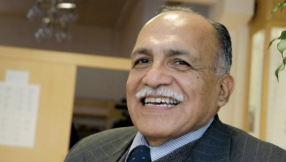
I once read a book in which the author asserted he didn't think Jesus was very "Christian". By this he seemed to mean that as he read the Gospels the person he discovered was far more surprising, unsettling and less "nice" than he had expected.
For the Jesus we read about is a deeply unsettling figure – constantly upending expectations, disturbing the comfortable and comforting the disturbed.
What about you? Is your "Jesus" rather tame – even boring? And if you're not yet a Christian, what kind of mental image of Jesus do you have – if you have one?
As we continue our fortnightly journey through Mark's Gospel we now reach a chapter where Jesus does some extremely surprising things. And the first of these is to do with his entry into Jerusalem. What happens is quite simple – and to many of us may almost be over-familiar: in Mark 11, Jesus gets hold of a donkey and rides it into the city, where he is greeted by cheering crowds thronging the streets.
"So what?" we might ask. Well, rather a lot, it turns out:
1. He's claiming to be a king – and a divine one at that. Jesus was deliberately acting out Old Testament prophecies about the Messiah such as this: "See, your king comes to you, righteous and having salvation, gentle and riding on a donkey," (Zechariah 9:9). It's an intentional claim to kingship.
And Jesus is not simply claiming to be a human king. Why at the end of this entry into Jerusalem does he go straight to the Temple (v11)? Because again he is deliberately fulfilling prophecies – this time about God. Malachi 3:1 says: "See I will send my messenger, who will prepare the way before me. Then suddenly the Lord you are seeking will come to his temple..." Does that stir our memories? It should do. Mark has already made it clear that a messenger has indeed gone ahead of Jesus, preparing the way – John the Baptist. And now the Lord – a role Jesus now claims as his own – is coming to his temple. He's asserting his divinity.
2. He's acting unexpectedly for a king – by being humble. Jesus subverts usual ideas of kingship. Scholar Stanley Hauerwas says Jesus is giving us a satire on what rulers usually do: "This triumphal entry parodies the entries of kings and armies. Victors in battle do not ride into their capital cities riding on asses but on fearsome horses, but this kind does not, and will not triumph through force of arms."
Jesus will not win by taking power and killing – but by giving up power and dying. His throne will be a cross. His crown will be made of thorns.
3. He's an unsettling king. All this was not what the cheering crowds in Jerusalem were expecting; they were looking for an anti-Roman revolutionary. But writer Tim Keller says this episode is a good example of how "what God does in the short run is very confusing" because Jesus is far more concerned about what we really need than what we want. The people wanted a revolution in the nation; but Jesus was bringing a revolution of the heart.
Tom Wright, former Bishop of Durham, says: "Have we so domesticated and trivialised our Christian commitment, our devotion to Jesus, that we look on him simply as someone to help us through the various things we want to do anyway, someone to provide us with comforting religious experiences?" And he continues – in words pertinently challenging, given that the church calendar has just marked the festival of Christ the King, and the upcoming season of Advent is all about waiting for that king: "Have we forgotten what, in biblical terms, a true King might be like?"
Apparently there's a church in Pepin, Wisconsin, which has regularly prayed, "Surprise me, Jesus." I can think of all sorts of inappropriate, self-centred ways this could be said. But if we want to see Jesus more clearly, understand who he is, and not settle for a pale imitation of the real thing, then why not? And so I pray, I hope humbly and reverently – and yet I must admit somewhat nervously: "Surprise me, Jesus."
David Baker is a former daily newspaper journalist now working as an Anglican minister in Sussex, England. The Rough Guide to Discipleship is a fortnightly series.













